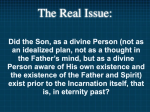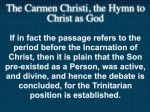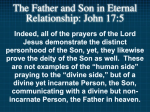I really hate to waste Christmas Eve on this kind of stuff, I really do.
It is honestly depressing that folks who *should* be willing to read and listen fairly are unwilling to do so. I do not know what is behind all of this, but maybe someday I will figure it out.
I have used pretty much all of the standard terms over the years to describe the divine Persons such as “subsistences,” for example. Outside of a very small cadre of socially challenged geeks, I do not know many who could tell you what a subsistence actually is. I know Roger Perkins would find the term useful in a debate, though only to mock it as another example of who far from biblical language the Trinity actually is. Maybe he would have gone for a discussion of perichoresis? Probably not. In any case, defining the term has been one of the greatest challenges in church history. I notice that none of my critics have taken umbrage to my positive presentation in that debate. I wonder why? Could it be that in that portion of the debate the central issue of dealing with Oneness teaching is addressed?
I went immediately to the heart of the debate. Here is the slide from my original presentation:

See the point? It’s important, and, I guess, maybe hard for those who do not take Christian theology out into these kinds of contexts to grasp. The man I was debating reduces the personal existence of the divine Persons to an idealized plan, a thought in the Father’s mind. To refute such a viewpoint (which is they laid as a filter over the entirety of the Scriptural witness), one must demonstrate interaction between the divine Persons as well as thought and initiative on the part of the Son in eternity past. I normally do this by going to John 1, John 17, and Phil. 2, which I did in the debate as well. So, from a later slide:

And one other:

So the issue was the demonstration of communication, interaction, love, between the divine Persons in eternity past. So Perkins then raised the terminology of “their own separate mind or center of consciousness” as an argument not about how the divine Persons relate (which would be the area of discussion amongst Christians) but as an argument against the very existence of three divine Persons. So the issue with Perkins, a Unitarian, is the existence of the Persons, and in this debate, their interaction with each other (as in John 17). When I responded to his terminology I said,
It is historic Christian doctrine to believe that the Father, the Son and the Spirit, are distinguishable divine persons fully sharing the one being that is God.
Now notice Perkins’ response:
“So I’m gonna ask you one more time. Are you comfortable then saying that the historic Christian doctrine of the Trinity worships a three-minded God?”
Now, if you are primarily used to discussing these issues in FB forums or on Twitter, you might just mute such a person. But there are no mute buttons in a debate.
You now have a very limited amount of time to respond to a Unitarian who denies the existence of the three Persons using this kind of rhetoric. I am sure each of my critics would do a much better job than I, to be sure! My response:
“No, that is a misrepresentation because it uses human language to describe what we’re talking about, you like to use that terminology and talk about a “three-minded God”. Clearly the Father loves the Son and the Son loves the Father. Therefore there must be centers of consciousness, to which love is a meaningful attribute for those words to be true. So whatever terminology you wish to use, the biblical teaching is that before creation was, the Son and the Father were in relationship with one another.”
Now, I hope even my critics will agree that it is just too painfully obvious that I am saying the exact same thing, in a debate context, that Lane Tipton said in discussing the relationship of the divine Persons on the Reformed Forum in 2016:
Here the Father, Son and Spirit are distinct willing agents; they are distinct hypostases who will distinctively and particularly as agents in the pactum salutis and that means that in addition to talking about subsistent relations within the essence we need room for a pactum salutis where those subsistent relations are self-conscious distinct willing agents who do not undermine the single simple divine essence or the single simple divine will.”
So when speaking to a Unitarian using the “center of consciousness” terminology I was defending the personal existence of the Persons, not seeking to compromise the unity of the essence. This is seen in the rest of what I said to him:
“Well that’s how persons relate to one another and speak to one another.”
Fair minded critics would recognize the contextual difference of speaking to fellow believers on this topic, and debating Roger Perkins.
Likewise missing from my critics was this statement which came immediately thereafter:
Well again, as my book in front of you clearly indicates reading human language into the existence of God can be very very difficult and we must be very very careful not to transfer the idea that would lead to the very error you represent and that is tri-theism, that you are accusing us of. So when we talk about divine persons, I clearly define what those persons are.”
Ironically, my critics assume “three centers of consciousness” means inevitable tri-theism even though that is denied, explicitly, right in the debate itself, as part of the answer that is cited. (To be honest, I haven’t seen any critic note that portion, as it is not helpful to their narrative).
Now, if someone would have preferred I expand the phrase to “those subsistent relations are self-conscious distinct willing agents who do not undermine the single simple divine essence or the single simple divine will,” that would be wonderful. It would also prove you have never tried to respond to questions on the clock.
So in conclusion, I would put it this way: my brothers who are willing to read fully and recognize context would never focus upon attempting to turn me into a heretic. I leave it for you to determine the motives of the others.


